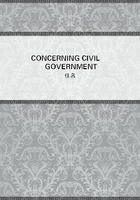
第48章
187. From all which it follows that the government of a conqueror, imposed by force on the subdued, against whom he had no right of war, or who joined not in the war against him, where he had right, has no obligation upon them.
188. But let us suppose that all the men of that community being all members of the same body politic, may be taken to have joined in that unjust war, wherein they are subdued, and so their lives are at the mercy of the conqueror.
189. I say this concerns not their children who are in their minority. For since a father hath not, in himself, a power over the life or liberty of his child, no act of his can possibly forfeit it; so that the children, whatever may have happened to the fathers, are free men, and the absolute power of the conqueror reaches no farther than the persons of the men that were subdued by him, and dies with them; and should he govern them as slaves, subjected to his absolute, arbitrary power, he has no such right of dominion over their children. He can have no power over them but by their own consent, whatever he may drive them to say or do, and he has no lawful authority, whilst force, and not choice, compels them to submission.
190. Every man is born with a double right. First, a right of freedom to his person, which no other man has a power over, but the free disposal of it lies in himself. Secondly, a right before any other man, to inherit, with his brethren, his father's goods.
191. By the first of these, a man is naturally free from subjection to any government, though he be born in a place under its jurisdiction. But if he disclaim the lawful government of the country he was born in, he must also quit the right that belonged to him, by the laws of it, and the possessions there descending to him from his ancestors, if it were a government made by their consent.
192. By the second, the inhabitants of any country, who are descended and derive a title to their estates from those who are subdued, and had a government forced upon them, against their free consents, retain a right to the possession of their ancestors, though they consent not freely to the government, whose hard conditions were, by force, imposed on the possessors of that country. For the first conqueror never having had a title to the land of that country, the people, who are the descendants of, or claim under those who were forced to submit to the yoke of a government by constraint, have always a right to shake it off, and free themselves from the usurpation or tyranny the sword hath brought in upon them, till their rulers put them under such a frame of government as they willingly and of choice consent to (which they can never be supposed to do, till either they are put in a full state of liberty to choose their government and governors, or at least till they have such standing laws to which they have, by themselves or their representatives, given their free consent, and also till they are allowed their due property, which is so to be proprietors of what they have that nobody can take away any part of it without their own consent, without which, men under any government are not in the state of free men, but are direct slaves under the force of war).
And who doubts but the Grecian Christians, descendants of the ancient possessors of that country, may justly cast off the Turkish yoke they have so long groaned under, whenever they have a power to do it?